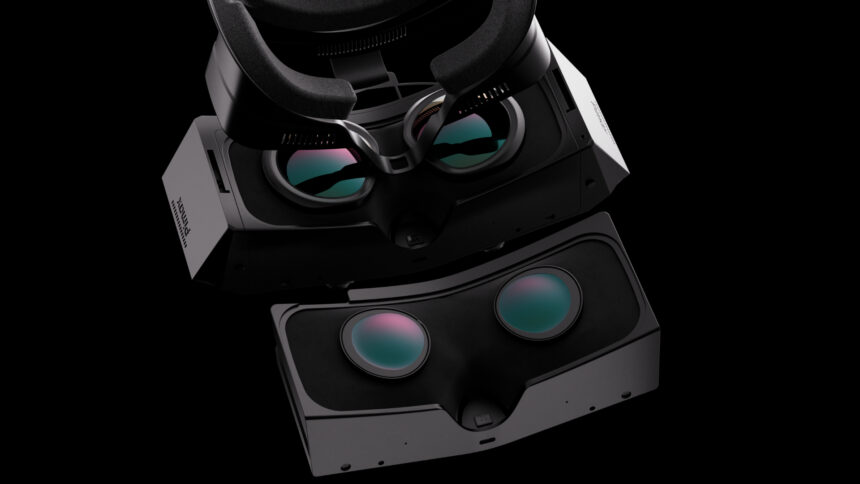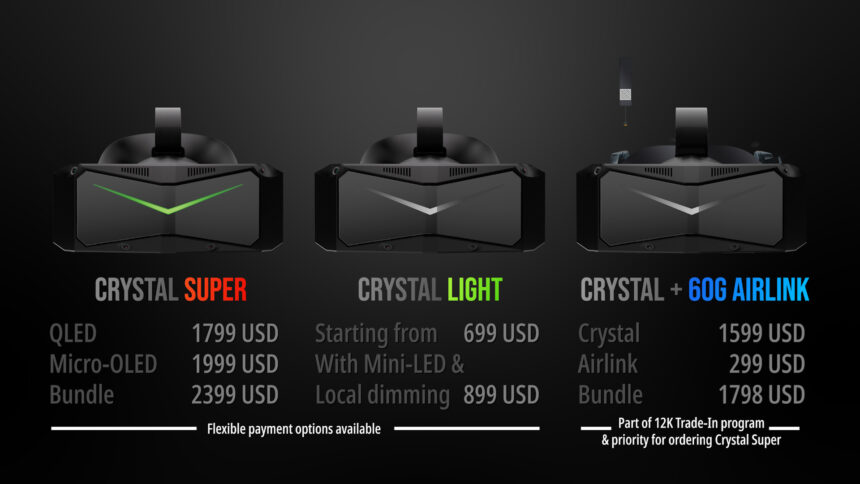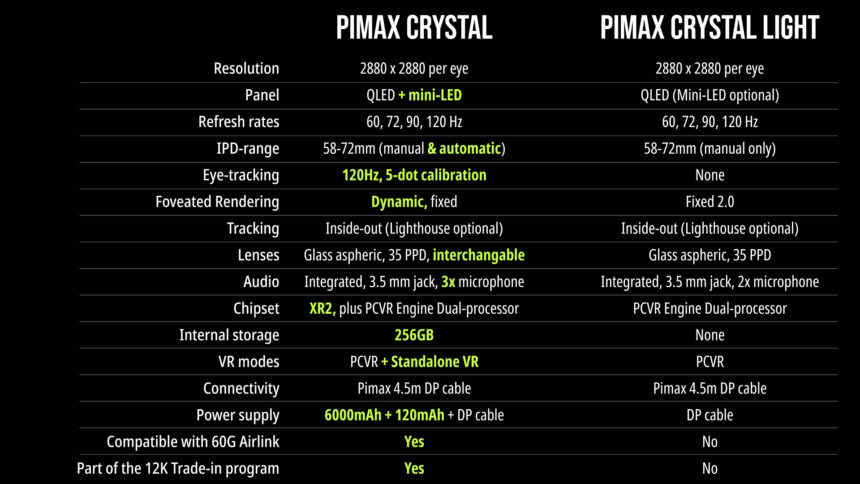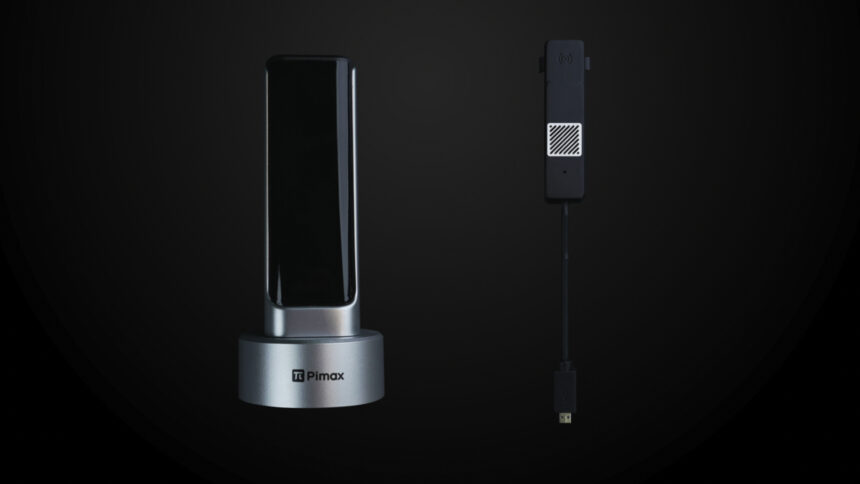Pimax introduces new Crystal Super & Crystal Light VR headsets

Pimax expands its product range with two new VR headsets. Here is a summary of what you can expect from the Crystal Super and Crystal Light.
Pimax unveiled two new VR headsets at the Frontier 2024 event: the Crystal Super with the world's first swappable optical engine and the budget-friendly Crystal Light. The company also announced specifications for its 60G Airlink module for wireless PC VR.
Crystal Super: QLED, Micro-OLED or both?
The Crystal Super is a dedicated PC VR headset with 29.5 million pixels, a significant increase over the 16.6 million pixels of the first Crystal. Other features include inside-out tracking via four cameras, eye tracking for automatic IPD adjustments, dynamic foveated rendering and integrated audio.
But the special feature of the Crystal Super is the interchangeable optical system which makes it easy to change displays and lenses and to switch between QLED and micro OLED panels. The QLED engine is paired with interchangeable aspheric glass lenses, while the Micro OLED engine integrates pancake lenses.

With its interchangeable panels and lenses, the Pimax Crystal Super has an interesting unique selling point. | Image: Pimax
Pimax Crystal Super: Technical details from the manufacturer
- Display: QLED+mini LED or Micro-OLED
- Resolution: 3840 × 3840 pixels per eye (QLED version, Micro-OLED)
- Number of pixels: 29.5 million (QLED version, Micro-OLED 4K per eye)
- Brightness: 200 nits (QLED version, micro-OLED TBC)
- Refresh rate: 72Hz/90Hz/120Hz (QLED version), 70Hz/90Hz (micro-OLED 70Hz/90Hz)
- Optics: Aspherical glass lenses (QLED version), pancake glass lenses (micro-OLED)
- Audio: Integrated, 3.5 mm audio socket, 2 microphones
- Tracking: Inside-out, lighthouse cover optional
- VR mode: PC VR only
- Price: From 1,799 US dollars (net)
- Available for pre-order now via the Pimax Online Store

Pimax is offering these prices for the newly announced models. | Image: Pimax
Crystal Light: Budget-friendly PC VR headset
The Crystal Light is a budget version of the Pimax Crystal. It retains core specifications such as 2880 × 2880 resolution per eye, a maximum refresh rate of 120 Hz and aspherical glass lenses. However, Pimax has done without the Crystal Light's standalone capability. As a pure PC VR headset without battery and XR2 processor, it is 30% lighter than the original Crystal.
Eye tracking and interchangeable lenses have also been removed. Instead, according to Pimax, fixed foveated rendering has been improved to compensate for potential GPU performance limitations. The Crystal Light will be significantly cheaper due to the aforementioned savings and will become a PC VR headset in the lower price segment.
With a starting price of $699, it is primarily intended to appeal to beginners and all those who can do without the standalone functions of the Crystal. The Crystal Light is now available for pre-order, with deliveries scheduled to begin in May 2024. The Pimax Crystal will remain in the range and will continue to be sold.

Pimax 60G Airlink module
The 60G Airlink Module enables wireless PC VR with the Pimax Crystal. It consists of a combined transmitter and receiver, as well as a dongle that connects to the headset via micro-HDMI. The transmitter and receiver connect to the PC via HDMI and form a complete hardware suite for wireless operation.

The 60G Airlink module consists of a combined transmitter and receiver and a micro HDMI dongle. | Image: Pimax
The 60G Airlink's Wigig technology is said to offer significantly higher bandwidth than traditional Wi-Fi solutions, including Wi-Fi 6E. According to Pimax, it minimizes visual compression and latency for a smooth wireless VR experience.
It supports the full resolution of 2880 × 2880 per eye, offers a 90 Hz refresh rate and ultra-low latency. Battery life is expected to be two to three hours. The 60G Airlink hardware shown at CES 2024 is now finalized and will ship later this year for $299.
Pimax continues its innovation strategy
Pimax is known for its ambitious VR headsets. With the Crystal Super, Crystal Light and the 60G Airlink module, the company continues its strategy of integrating innovative features into its products. In 2023, Pimax had already funded the Pimax Portal, a handheld console with optional VR headset accessories, through a Kickstarter campaign and launched the high-end standalone headset Pimax Crystal with interchangeable lenses, eye and face tracking and QLED displays.
Pimax further differentiates its range
With the introduction of Crystal Super and Crystal Light, Pimax further differentiates its VR headset portfolio. The company now caters to a wider range of users, from price-conscious beginners to the most demanding enthusiasts. The Crystal Super is designed to appeal to tech-savvy early adopters who value flexibility and cutting-edge technology.
The ability to switch between QLED and micro-OLED panels is a unique selling point that could give Pimax a competitive advantage. However, it remains to be seen how practical and reliable the switching mechanism is in everyday use and what added value it provides.
With the Crystal Light, Pimax addresses a target group that has so far shied away from Pimax headsets due to their high price. For $699, users will get many of the benefits of the original Crystal, such as high resolution and refresh rate, but will have to sacrifice comfort features such as eye tracking and interchangeable lenses — certainly a fair deal for some users.
Use the following link and add the referral code "mixed" to your order at Pimax to receive a discount of 3% off the base price for all products.
Note: Links to online stores in articles can be so-called affiliate links. If you buy through this link, MIXED receives a commission from the provider. For you the price does not change.